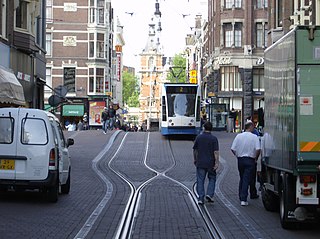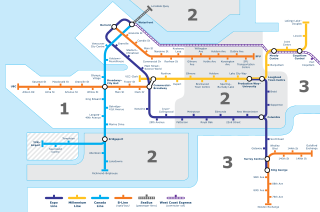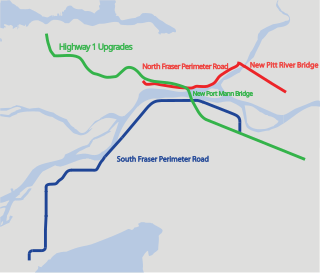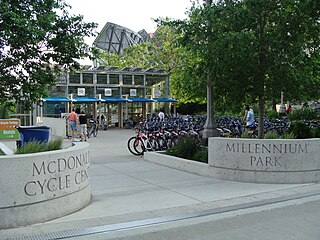
Victoria is the capital city of the Canadian province of British Columbia, on the southern tip of Vancouver Island off Canada's Pacific coast. The city has a population of 91,867, and the Greater Victoria area has a population of 397,237. The city of Victoria is the 7th most densely populated city in Canada with 4,405.8 inhabitants per square kilometre (11,411/sq mi).

Bicycle-friendly policies and practices help some people feel more comfortable about traveling by bicycle with other traffic. The level of bicycle-friendliness of an environment can be influenced by many factors including town planning and cycling infrastructure decisions. A stigma towards people who ride bicycles and fear of cycling is a social construct that needs to be fully understood when promoting a bicycle friendly culture.

TransLink, formally the South Coast British Columbia Transportation Authority, is the statutory authority responsible for the regional transportation network of Metro Vancouver in British Columbia, Canada, including public transport, major roads and bridges. Its main operating facilities are located in the city of New Westminster.

Intermodal passenger transport, also called mixed-mode commuting, involves using two or more modes of transportation in a journey. Mixed-mode commuting is often used to combine the strengths of various transportation options. A major goal of modern intermodal passenger transport is to reduce dependence on the automobile as the major mode of ground transportation and increase use of public transport. To assist the traveller, various intermodal journey planners such as Rome2rio and Google Transit have been devised to help travellers plan and schedule their journey.

Bicycle commuting is the use of a bicycle to travel from home to a place of work or study — in contrast to the use of a bicycle for sport, recreation or touring.

Transportation demand management, traffic demand management or travel demand management (TDM) is the application of strategies and policies to reduce travel demand, or to redistribute this demand in space or in time.

Transportation in Vancouver, British Columbia, has many of the features of modern cities worldwide. Unlike many large metropolises, Vancouver has no freeways into or through the downtown area. A proposed freeway through the downtown was rejected in the 1960s by a coalition of citizens, community leaders and planners. This event "signalled the emergence of a new concept of the urban landscape" and has been a consistent element of the city's planning ever since.

Transport in Winnipeg involves various transportation systems, including both private and public services, and modes of transport in the capital city of Manitoba.

Halifax Regional Municipality has a multi-modal transportation network.

The Gateway Program is a C$3.0 billion regional transportation project for Metro Vancouver and surrounding areas that is being managed by the British Columbia Ministry of Transportation. The ministry introduced the Gateway Program on January 31, 2006, as a means to address growing congestion and reduce travel times. The bulk of the construction took place from 2006-2014 and saw the completion of the Golden Ears Bridge, the Pitt River Bridge, the Port Mann Bridge, improvements on the Sea-to-Sky highway, and finally the construction of the South Fraser Perimeter Road.

McDonald's Cycle Center is an indoor bike station in the northeast corner of Millennium Park in the Loop community area of Chicago, in the U.S. state of Illinois. The city of Chicago built the center at the intersection of East Randolph Street and Columbus Drive, and opened it July 2004. Since June 2006, it has been sponsored by McDonald's and several other partners, including city departments and bicycle advocacy organizations. The bike station, which serves bicycle commuters and utility cyclists, provides lockers, showers, a snack bar with outdoor summer seating, bike repair, bike rental and 300 bicycle parking spaces as of 2004. The Cycle Center is accessible by membership and day pass. It also accommodates runners and inline skaters, and provides space for a Chicago Police Department Bike Patrol Group.
Montreal is a city located in Quebec, Canada and is one of the transportation hubs for eastern Canada and most of Quebec, with well-developed air, road, rail, and maritime links to the rest of Canada, as well as the United States and the rest of the world.
Green Action Centre (GAC) (formally known as the Recycling Council of Manitoba and the Resource Conservation Manitoba) is an environmental non-profit organization based in Manitoba, Canada. It includes promoting greener living through environmental education for households, workplaces, schools, and communities. It also develops and advocates environmental policies for the Manitoba communities. Its primary areas of activity include; green commuting, composting and waste, sustainable living, and resource conservation.

Cycling in Canada is experienced in various ways across a geographically huge, economically and socially diverse country. Among the reasons for cycling in Canada are for practical reasons such as commuting to work or school, for sports such as road racing, BMX, Mountain bike racing, freestyle BMX, as well as for pure recreation. The amount and quality of bicycle infrastructure varies widely across the country as do the laws pertaining to cyclists such as bicycle helmet laws which can differ by province.
The ValloCycle Bike-Share Program is a mutual agreement between the University of Montevallo and Montevallo city to offer bicycle rentals to the surrounding community. Annual membership fees amount to roughly $2 per month for adults and $1 per month for children.
Commuter Challenge is a national, week long event in Canada and is held annually during the Canadian Environment Week. Formatted as a friendly competition between workplaces and Canadian municipalities, the national and host city coordinators announce winners based on the highest percent participation. The event has a strong workplace focus where employers promote the event in-house to support their employees in leaving their cars at home in favour of more sustainable commuter modes including walking, jogging, cycling, in-line skating, public transit, carpooling and remote work.
The Vancouver Greenway Network is a collection of greenways across Vancouver, British Columbia, Canada. Greenways are streets where pedestrians and cyclists are prioritized over motorized vehicles, through structures such as road closures and road diverters to prevent or limit motor vehicle traffic, widened sidewalk-promenades, narrowed road space, speed restrictions, bike lanes, raised sidewalks and speed bumps. The City of Vancouver hopes to create and maintain the trend of constructing new greenways to establish a network where, potentially, every citizen could access a city greenway within a 25-minute walking or a 10-minute cycling distance of their home.

Bowinn Ma, MLA is a Canadian politician, who was elected to the Legislative Assembly of British Columbia in the 2017 provincial election. Ma then stood for re-election in the 2020 British Columbia general election, again for the British Columbia New Democratic Party. Ma won decisively a second term, in spite of some BC Liberal harassment of her. She represents the electoral district of North Vancouver-Lonsdale as a member of the British Columbia New Democratic Party caucus.

Parkbus is a Canadian not-for-profit organization that provides bus transportation from major cities to nearby parks and conservation areas. Its purpose is to enable citizens to access nature and the outdoors without owning a car.













